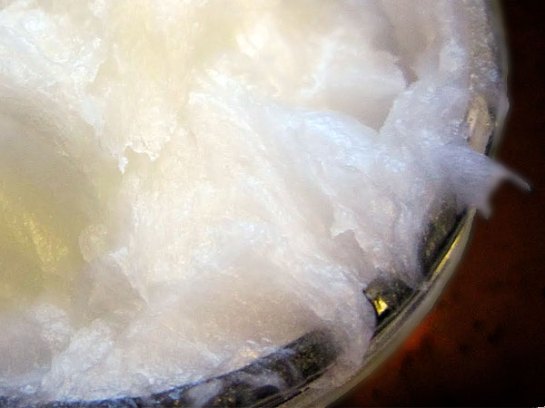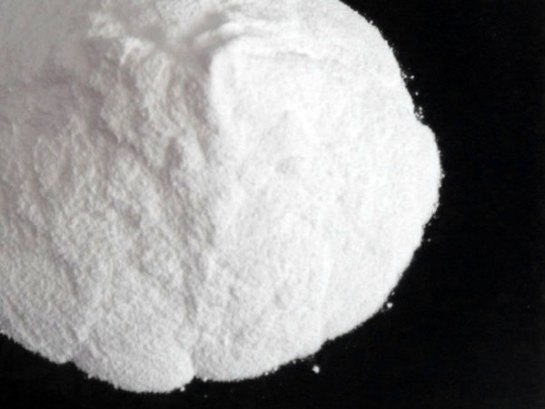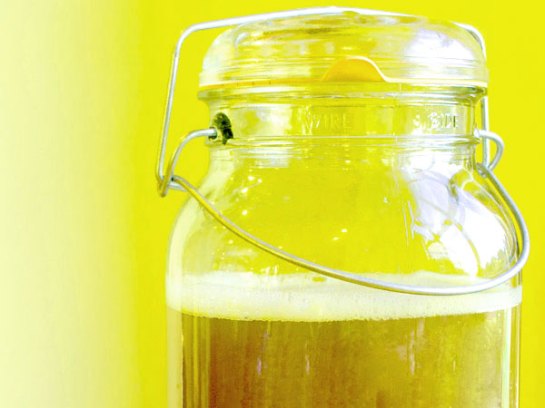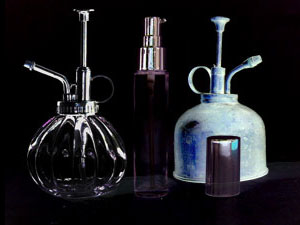Make Your Own Deodorant! It‘s Simple!
Please don‘t worry, I’m not going to transform this blog into an all-over beauty blog! However, yesterday I spontaneously made my own deodorant spray out of water and baking soda. This spray and some other natural deodorant recipes I have tried recently, seem to be the only “products” that both work AND are gentle on my skin! I still sweat, but no stank! I find it awesome how easy it is to produce your own deodorant avoiding all kinds of chemicals you can find in most commercial products! You‘ll see!
First off all, a clarification: While antiperspirants contain substances that constrict the sweat glands so that less sweat is excreted (thus backing metabolic toxins up into your lymph), deodorants prevent odor or simply overlap it. In both cases we still sweat, sometimes more, sometimes less. Surely you probably knew about it, but I’ll write it down for you once again: Sweat in itself isn‘t odiferous, but as soon as it is degraded by bacteria on the skin it produces its characteristic “odors“. I know, this is a very simple and unscientific explanation, but you can still read more about it – if you want! Here, here and here!
I know, having sweaty underarms is embarrassing and extremely inconvenient! But if you are using commercial deodorants or antiperspirants, have a quick look at the list of ingredients first. Google them to find out more about them. Believe me, there is lots of stuff in there that you do not really want to put on your skin! Sweating is nature’s way of lowering the temperature of your body and prohibiting this by blocking the pores is not ideal. Also, the aluminum compounds and parabens in most commercial antiperspirants and deodorants are not really your most healthy friends! A study by British scientists found that aluminum may be linked to breast cancer. In addition, recent studies have raised concerns over the gradual build-up of parabens in the body and linked them to hormone disruption – and again cancer. However, these studies are not universally accepted, and there is a mainstream scientific consensus that on the whole parabens and aluminium are safe and non-irritating. But do we know for sure?
Further Reading:
link between breast cancer and antiperspirant
are parabens natural?
parabens – an introduction
cancercontroversies: deodorants and cancer
Yes, you can still buy some good organic deodorants, but it bugs me that these products are expensive and almost always smell extremely lemony! So I continued to try, try and try new products, but I was never really satisfied. Until I tried my own recipes – easy to make and inexpensive! And the best thing about it: they work just as good as (or even better than) most commercial brands!
So if you are tired of hunting for ready-made and non-harmful deodorants just like me, give them a go:
1) Pure Coconut Oil
What’s easier than that? Coconut oil is pleasantly scented, very gentle on the skin and rich in lauric acid which fights bacteria naturally. Bacteria is what leads to stinkiness, so coconut oil is your best weapon!
Put some coconut oil into the palms of your hands and rub them against each other. As soon as it comes into contact with your skin, it will melt and become creamy and spreadable. Coconut oil is easily absorbed, leaving no stains on your clothes. It has a faint coconut scent, but it isn‘t really noticeable. Moreover, it’s a very stable oil and won‘t turn rancid easily. You can also try to whip the coconut oil before using it as a deodorant (or body butter) which makes it easy to apply. Just follow this amazing tip from Nourished Living!

2) Water and Baking Soda
If you don‘t like the smell of coconut or prefer a less creamy consistency, make your own deodorant spray out of water and baking soda (sodium bicarbonate): baking soda is often very grainy and doesn‘t dissolve easily. That‘s why you should boil some water first, then stir in the baking soda.
Fill it in a spray bottle. As an option, add some (non-nano!) zinc oxide powder for extra antibacterial benefits:
– 100 ml (3.38 oz) water
– 1/2 tsp baking soda
– optional: 1/2 tsp zinc oxide
If you like to smell lovely, add a few drops of essential oils! For best results, shake your bottle vigorously before each use!

3) Coconut Oil and Baking Soda
Another awesome recipe including coconut oil and baking soda is this one from Vanilla and Lace. Check it out, it‘s really easy to make! You’ll only need a fork and a bowl! Personally, I don’t like the fine graininess of the original recipe (that’s the baking soda). But if you don’t mind a little extra work, you can still comminute the baking soda (and arrowroot) to a much finer powder in an old coffee grinder or in a mortar to obtain a silky smooth cream! Whip the coconut oil before adding it to the recipe. You’ll love that incredibly soft texture! Trust me!
4) Coconut Oil, Shea Butter and Zinc Oxide
This is a great alternative to the baking soda recipes, if you have issues with it. It can be itchy at times and can cause rashes in some people who are sensitive to it. However, make sure, to buy ONLY non-nano zinc oxide powder and to wear a mask during the preparation of this concoction! Unfortunately, it’s not easy to get your hands on some zinc oxide that doesn’t consist of nano particles, which can easily be absorbed by your lungs while making your sunscreen! Please avoid it!
– 1 tbsp zinc oxide
– 4 tbsp coconut oil
– 1 tbsp shea butter
– optional: 5-10 drops essential oils of your choice
Mix together all ingredients with a fork in a bowl (you’re not using for eating), then add essential oils gradually to your liking. Shea butter softens a lot and will also most likely help with the little bumps you get from shaving! So what are you waiting for?
5) Apple Cider Vinegar (or Lemon Juice)
If you don‘t have a romantic date today and like simple solutions, try pure apple cider vinegar on a cotton pad (mixed with 50-70 % water, if you have sensitive skin) and apply it to your armpits. Yes, apple cider vinegar does not have the nicest smell, but it evaporates very fast! You’ll hardly even notice it. Maybe, if you dig your nose right into your armpits, you‘ll still be able to smell it faintly! So forget about this option if you‘re going to stay very close to somebody tonight – or simply replace the vinegar with lemon juice!

6) Apple Cider Vinegar Spray
Anyway, apple cider vinegar can be a lot less repellent if mixed with essential oils!
Mix 30 ml (1 oz) apple cider vinegar with 70 ml (2.36 oz) water and put it in a spray bottle. Add 40-60 drops of essential oils.
Sweat-regulating and soothing oils such as sage, lavender, chamomile or calendula are an excellent choice. But of course you can use any other oil you prefer! Be cautious though: Some of these oils are really intense! Remember that your finished deodorant shouldn‘t be too overpowering!

Conclusion
We are all individuals. For some, those alkaline baking soda recipes work like a charm, others might need something more neutral (coconut oil) or acidic (apple cider vinegar or lemon juice). That’s why I posted a few different methods and recipes. Try them out to find the one that really suits you!
Self-made deodorants do not contain any preservatives and are therefore – unlike most commercial products – not made to last. Especially if you are making a spray, prepare only small amounts and store it in the fridge – or add a small amount of pure alcohol (about 5 ml (or 1 tsp) to one liter of water) to keep it fresh. However, if you like coconut, there’s good news: Coconut oil does not go off easily – on the contrary, it protects itself against bacteria and yeast!
And remember: Everything you put INTO your body must come out in some way! All of your glands are capable of excreting toxins that are otherwise not filtered by your kidneys. That’s why poor diets filled with preservatives, sugar and bad fats can make you smell, but so do some foods considered part of a healthy diet. Excessive consumption of alcohol, cured, pickled and highly processed or preserved foods, but also an excessive consumption of garlic and red meat will eventually lead to body odor.
If you are often wearing very tight synthetic shirts, there is a good chance that the shirt (not your skin!) may assume an offensive odor! Instead, try to select clothing made of natural fibers such as cotton or linen. Also, shaving your axillary hair on a regular basis will help to decrease the bacteria population and help to diminish the smell of perspiration!
What kind of deodorant do you guys use these days? Are you still using the more traditional store-bought kind or have you switched over to a more natural brand? Did you ever try to make your own deodorant? And if so, have you had any problems with it?
© images by Svea


Svea, you’re wicked cool! Thanks for this!!!
I’m totally trying one of these recipes! I’ll be starting with the coconut, shea butter and zinc oxide one!
And guess what? I fall into the category of “I never would have even thought about making my own deodorant”! I thought it would be kind of scary and complicated, but I guess it isn’t. Is it?
By the way: I love your blog! 🙂
Thanks a lot Gianna! I’m glad you like it! 😉
And NO, it’s not scary or complicated! It’s unbelievably easy, you’ll see!
Please keep me posted!
Awesome! I’ve been making my own deodorant for quite a while now and it’s great, so cheap! I never thought of using Apple Cider Vinegar! Interesting. I’ve tried the straight coconut oil and haven’t found it works. But the baking soda does…very well! Also, fresh squeezed lemon or lime juice works very well! Not if you have cuts from shaving, though (ouuuuch) Awesome post 🙂
http://mesonoxxian.blogspot.ca/
Hi Lizzie!
Sorry, I’ve found your comment in my spam folder only now! 😦 I have no idea why it ended up in there … maybe because of the link. It’s your blog, isn’t it? I’ll read it tomorrow for sure! Now it’s 1:30 in the morning over here in Italy. I guess it’s time to catch a few ZZZs!
For me coconut oil works quite well, but everybody is different! I’ve read somewhere that it’s much more effective in killing bacteria combined with alkaline substances. I’m washing with handmade soap before applying it. Maybe that’s why it works!
Anyway, lemon juice definitely smells better than apple cider vinegar on the long run (my opinion). 😀
Lovely! I’d like to read something similar about homemade shampoos, any idea? So far, I’ve found solutions involving mainly baking soda and (separately!) vinegar, and I also know about rhassoul clay and chickpea flour, but I’m eager to find out some more to choose my ideal one 🙂 Furthermore, I am afraid that soda and clay on the long run might be a bit drying, but adding an oil just doesn’t sound… safe to me 😀
OK, I’ll do a post about it! On monday there will be another article, but it’ll be online next friday! 😀
I hope you can wait until then …
No need to hurry at all 🙂 take it easy!
I’ll try some recipes in the meantime… Have a nice week ahead 🙂
Thanks for sharing your beautiful creativity!
Thanks lovely! 😉
Don’t worry, it should be quite fun to write about it!
Have a nice week as well!
I made my own with water, tea tree oil, baking soda, and cornstarch. I put it in an old spray bottle and it works! I don’t sweat heavily, but you can’t even smell anything. I would like to try multiple recipes and compare though.
Your recipe sounds great! I’m still extremely fond of my simple water and baking soda spray, but maybe I’ll fancy it up with a little lavender oil the next time. Also, cornstarch could be helpful in the summer months to stay “dry”! I’ll give it a try for sure!